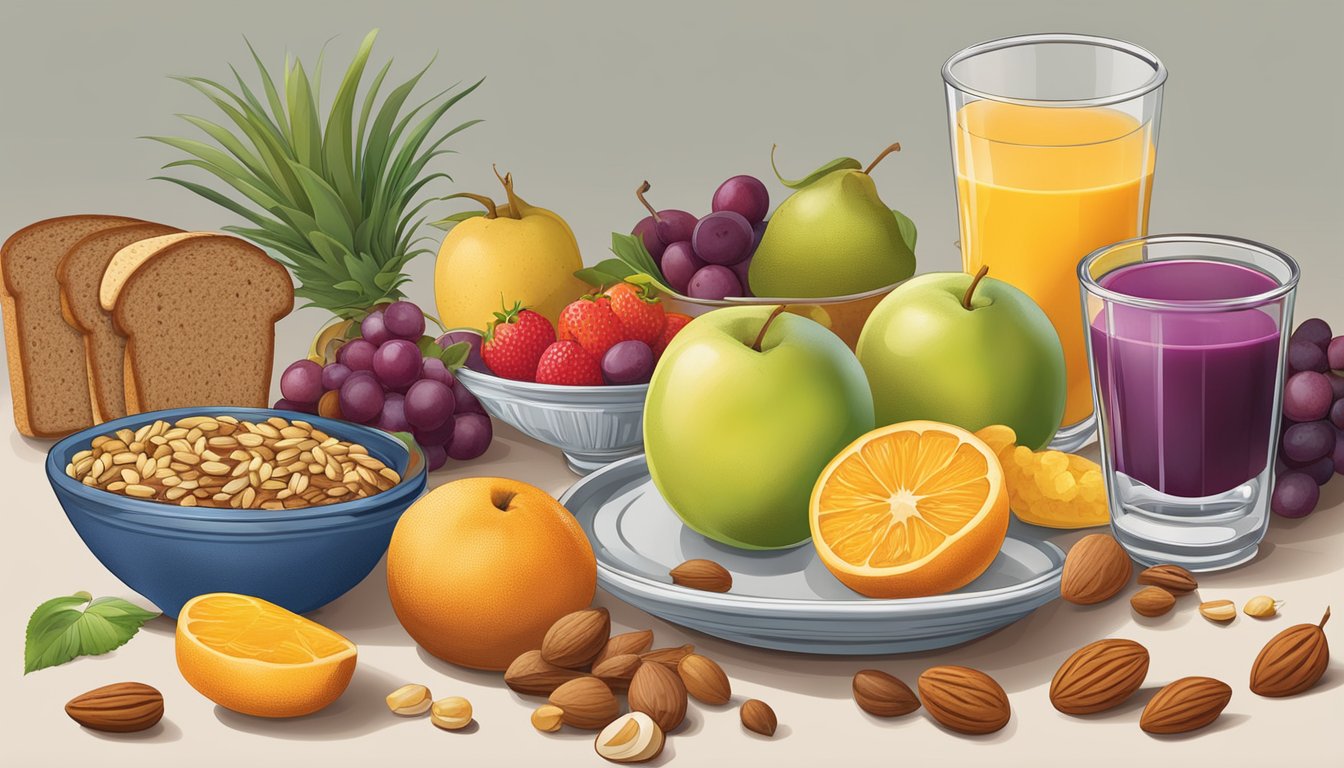Whole food breakfasts provide a nourishing start to the day, offering essential nutrients and sustained energy. These meals typically consist of unprocessed or minimally processed ingredients, such as fruits, vegetables, whole grains, and lean proteins. Incorporating whole foods into breakfast can improve overall health, boost metabolism, and support weight management goals.
Many people find that switching to whole food breakfasts helps them feel more satisfied and focused throughout the morning. Options range from simple combinations like avocado toast on whole grain bread to more elaborate dishes such as vegetable-packed omelets or homemade granola with fresh berries and yogurt. These meals are often naturally gluten-free, dairy-free, and free from refined sugars, making them suitable for various dietary preferences and restrictions.
Preparing whole food breakfasts doesn’t have to be time-consuming. With a bit of planning and some quick recipes, it’s possible to enjoy nutritious morning meals even on busy weekdays. From make-ahead overnight oats to speedy green smoothies, there are plenty of options for those seeking convenient yet healthy breakfast choices.
The Importance of Whole Food for Breakfast
Whole foods provide essential nutrients and sustained energy for a productive start to the day. They offer numerous health benefits and help maintain stable blood sugar levels throughout the morning.
Understanding Whole Foods
Whole foods are unprocessed or minimally processed ingredients in their natural state. These include fresh fruits, vegetables, whole grains, nuts, seeds, and lean proteins.
Whole foods retain their full nutritional value, including vitamins, minerals, fiber, and phytonutrients. They lack added sugars, artificial preservatives, and excessive sodium often found in processed breakfast options.
Examples of whole food breakfast choices:
- Oatmeal with fresh berries and nuts
- Greek yogurt with sliced fruit and granola
- Whole grain toast with avocado and eggs
- Smoothie made with spinach, banana, and almond milk
Benefits of a Nutrient-Dense Start
A whole food breakfast provides numerous advantages for physical and mental well-being. It offers sustained energy release, preventing mid-morning crashes often associated with sugary processed foods.
Key benefits include:
- Improved concentration and focus
- Enhanced metabolism
- Better weight management
- Stabilized blood sugar levels
Whole foods are rich in fiber, promoting digestive health and prolonged satiety. They also contain antioxidants that support the immune system and overall health.
Choosing whole foods for breakfast establishes a foundation for healthier eating habits throughout the day. It encourages mindful food choices and helps maintain consistent energy levels for improved productivity.
Essential Components of Whole Food Breakfasts

A nutritious whole food breakfast contains key elements that provide sustained energy and nourishment. These components work together to support overall health and kickstart the day on a positive note.
Sources of High-Quality Protein
Protein is crucial for muscle maintenance, satiety, and balanced blood sugar levels. Eggs are an excellent protein source, offering all essential amino acids. For those avoiding animal products, plant-based options like quinoa, chia seeds, and hemp hearts provide complete proteins.
Nuts and seeds, such as almonds and pumpkin seeds, offer protein along with beneficial fats. Greek yogurt, if dairy is included, delivers a protein punch with probiotics for gut health.
Tofu and tempeh, made from soybeans, are versatile protein sources for those following a plant-based diet. These can be seasoned and prepared in various ways to suit different taste preferences.
Healthy Fats for Long-Term Satiety
Incorporating healthy fats is essential for feeling full and satisfied. Avocados are rich in monounsaturated fats and fiber. They can be mashed on whole grain toast or added to smoothies for creaminess.
Nuts and seeds provide omega-3 fatty acids, particularly important for brain function. Chia seeds, flaxseeds, and walnuts are excellent choices. These can be sprinkled on oatmeal or blended into smoothies.
Coconut oil and extra virgin olive oil can be used in moderation for cooking or added to dishes for flavor and satiety. These fats help with nutrient absorption and provide long-lasting energy.
Complex Carbohydrates for Energy
Complex carbohydrates offer sustained energy release and essential nutrients. Whole grains like oats, quinoa, and buckwheat are fiber-rich options. They can be prepared as hot cereals or used in baked goods.
Sweet potatoes and other starchy vegetables provide complex carbs along with vitamins and minerals. These can be roasted and served with eggs or added to breakfast bowls.
Fruits offer natural sweetness and fiber. Berries, apples, and pears are lower in sugar and high in antioxidants. They can be eaten whole, added to yogurt, or blended into smoothies.
Whole grain breads and wraps can serve as bases for open-faced sandwiches or breakfast burritos. Look for options with minimal ingredients and no added sugars.
Popular Whole Food Breakfast Items
Whole food breakfast options offer nourishing and satisfying ways to start the day. These nutrient-dense choices provide sustained energy and promote overall health.
Eggs and Egg-based Dishes
Eggs are a versatile and protein-rich breakfast staple. Scrambled, poached, or hard-boiled eggs pair well with whole grain toast and fresh vegetables. Frittatas make an excellent option for a hearty breakfast, combining eggs with vegetables, herbs, and sometimes cheese.
Omelets allow for customization with various fillings like spinach, mushrooms, and tomatoes. For a quick and portable option, egg muffins can be prepared in advance and reheated throughout the week.
Egg white scrambles offer a lower-calorie alternative while still providing ample protein. Adding avocado to egg dishes increases healthy fat content and creates a creamy texture.
Savory Breakfast Skillets and Hashes
Breakfast skillets and hashes incorporate a variety of whole foods into one satisfying dish. Sweet potatoes, bell peppers, onions, and leafy greens form the base of many breakfast hashes.
Adding lean proteins like turkey sausage or chicken breast increases the meal’s staying power. Vegetarian options might include black beans or tempeh for plant-based protein.
Herbs and spices such as rosemary, thyme, and paprika enhance flavor without adding excess calories. Topping skillets with a fried egg provides extra protein and a rich, runny yolk.
These dishes can be easily customized to accommodate dietary preferences and seasonal produce availability.
Whole Grains and Cereals
Oatmeal stands out as a popular whole grain breakfast choice. Steel-cut, rolled, or quick oats offer different textures to suit individual preferences. Toppings like fresh berries, sliced almonds, and a drizzle of honey add flavor and nutrients.
Quinoa porridge provides a protein-rich alternative to traditional oatmeal. Buckwheat groats can be cooked and served as a warm cereal or used to make pancakes.
Whole grain toast serves as a simple base for toppings like avocado, nut butter, or smashed berries. Muesli, a mix of raw oats, nuts, and dried fruits, can be enjoyed with milk or yogurt.
Homemade granola allows control over ingredients and sugar content, making it a healthier option than many store-bought varieties.
Green Smoothies and Smoothie Bowls
Green smoothies pack a nutritional punch by blending leafy greens with fruits and plant-based milk. Spinach and kale are popular choices for their mild flavor and nutrient density.
Adding banana or mango creates a creamy texture and natural sweetness. Chia seeds or flaxseeds boost omega-3 fatty acid content.
Smoothie bowls offer a thicker consistency, perfect for topping with sliced fruits, nuts, and seeds. Acai bowls, made with antioxidant-rich acai berries, have gained popularity in recent years.
Greek yogurt can be blended in for extra protein and a tangy flavor. Protein powders derived from peas, hemp, or whey are optional additions for those seeking higher protein content.
Whole Food Breakfast Recipes for Specific Diets

Whole food breakfast recipes can be adapted to meet various dietary needs and preferences. These options focus on nutrient-dense ingredients while avoiding processed foods.
Paleo and Whole30 Breakfast Options
Paleo and Whole30 breakfasts emphasize unprocessed, whole foods. Eggs are a staple, often paired with vegetables and healthy fats. Sweet potato hash browns topped with fried eggs and avocado make a satisfying meal.
Frittatas loaded with spinach, mushrooms, and ham offer a protein-packed start to the day. For a sweeter option, try grain-free pancakes made with almond flour and topped with fresh berries.
Breakfast bowls featuring sautéed kale, ground turkey, and roasted butternut squash provide a savory alternative. Chia seed pudding made with coconut milk and topped with nuts and cinnamon is another Whole30-compliant choice.
Vegan and Dairy-Free Alternatives
Vegan and dairy-free breakfasts can be just as delicious and nutritious. Overnight oats prepared with plant-based milk and chia seeds make a quick, filling meal. Top with sliced almonds and fresh fruit for added texture and flavor.
Tofu scrambles seasoned with turmeric and nutritional yeast mimic scrambled eggs. Serve with roasted vegetables and avocado for a complete meal. Smoothie bowls blended with frozen bananas, berries, and spinach offer a refreshing option.
Whole grain toast topped with mashed avocado, tomato slices, and hemp seeds provides a balanced start. For a warm treat, try buckwheat porridge cooked in almond milk and topped with cinnamon and stewed apples.
Convenient Breakfasts for Busy Mornings

Preparing nutritious whole food breakfasts doesn’t have to be time-consuming. With some simple strategies and make-ahead options, you can enjoy healthy meals even on hectic mornings.
Overnight Oats and Baked Oatmeal
Overnight oats are a versatile and effortless breakfast choice. Simply combine rolled oats with milk, yogurt, or plant-based alternatives in a jar. Add fruits, nuts, and spices for flavor. Refrigerate overnight, and enjoy a ready-to-eat meal in the morning.
Baked oatmeal offers another convenient option. Mix oats, milk, eggs, and desired add-ins in a baking dish. Prepare a large batch on the weekend and portion it out for the week. Reheat individual servings quickly in the microwave or enjoy cold.
Both options provide fiber, protein, and complex carbohydrates. They’re customizable to suit different tastes and dietary needs.
Homemade Breakfast Bars and Casseroles
Breakfast bars are portable and easy to grab on the go. Make a batch using whole grains, nuts, seeds, and dried fruits. Store them in an airtight container for up to a week.
Breakfast casseroles are perfect for meal prepping. Combine eggs, vegetables, cheese, and meat or plant-based proteins in a baking dish. Cook once and enjoy throughout the week. A popular variation is the sausage egg bake, which offers a hearty start to the day.
These options provide balanced nutrition and can be tailored to individual preferences. They save time on busy mornings while ensuring a satisfying meal.
Sheet Pan and Make-Ahead Breakfasts
Sheet pan breakfasts streamline cooking and cleanup. Roast a combination of vegetables, proteins, and potatoes on a single pan. Portion into containers for quick reheating throughout the week.
Make-ahead breakfast sandwiches or burritos are another time-saving option. Assemble ingredients like eggs, cheese, and vegetables in whole grain wraps or English muffins. Freeze individually and microwave as needed.
Smoothie packs are ideal for ultra-busy mornings. Pre-portion fruits, vegetables, and add-ins into freezer bags. Blend with liquid for an instant nutrient-packed breakfast.
These methods minimize morning prep time while providing wholesome, satisfying meals.
Avoiding Processed Foods in Breakfast Choices
Selecting whole food options for breakfast can significantly improve nutritional intake and overall health. Many common breakfast items contain hidden sugars and additives that may negatively impact wellness goals.
Identifying Hidden Sugars and Additives
Processed breakfast foods often contain unexpected sugars and additives. Granola bars, while convenient, frequently include added sugars and artificial ingredients. Check labels for terms like high fructose corn syrup, dextrose, and maltodextrin.
Many cereals market themselves as healthy but contain high amounts of sugar. Look out for ingredients ending in “-ose” as these are typically sugars. Artificial colors and preservatives are common in processed breakfast items.
Flavored yogurts often have added sugars equivalent to desserts. Even seemingly healthy options like instant oatmeal packets can contain excessive sugar and artificial flavors.
Whole Food Alternatives to Common Breakfast Items
Replacing processed options with whole foods can boost nutrition and satisfaction. Instead of sugary cereals, try oatmeal topped with fresh berries and nuts. This provides fiber, protein, and natural sweetness.
For a savory option, sweet potato hash browns offer a nutrient-dense alternative to processed potato products. Simply grate sweet potatoes and cook in a pan with olive oil and spices.
Homemade smoothies using whole fruits, leafy greens, and plain yogurt can replace processed breakfast drinks. Add chia seeds or ground flaxseed for extra nutrition.
Eggs with vegetables make a protein-rich meal. Pair with whole grain toast and avocado for healthy fats and fiber. Greek yogurt with fresh fruit and a drizzle of honey provides protein without artificial additives.
Creativity in Whole Food Breakfasts
Exploring innovative ingredients and presentation techniques can transform ordinary whole food breakfasts into extraordinary culinary experiences. Vegetables, healthy fats, and creative combinations open up a world of flavorful possibilities.
Innovative Uses of Vegetables and Healthy Fats
Cauliflower fried rice offers a low-carb twist on a classic dish. Grated cauliflower replaces traditional rice, sautéed with vegetables and eggs for a nutrient-dense meal. Sweet potato hash provides a colorful and antioxidant-rich alternative to regular potatoes. Cubed sweet potatoes are pan-fried with onions, bell peppers, and spices.
Almond butter adds creamy texture and protein to breakfast bowls or smoothies. Spread on whole grain toast or used as a dip for fresh fruit slices. Avocado toast remains a popular choice, offering healthy fats and endless topping variations. Try adding sliced radishes, microgreens, or a sprinkle of hemp seeds for extra nutrition and crunch.
Impressive Whole Food Breakfast Entertaining
Potato crust quiche makes for an eye-catching centerpiece at brunch gatherings. Thinly sliced potatoes form a crispy base for a vegetable-packed egg filling. Breakfast tacos allow guests to customize their meal. Set out bowls of scrambled eggs, black beans, diced tomatoes, and sliced avocado alongside warm corn tortillas.
A build-your-own smoothie bowl bar encourages creativity. Offer a variety of frozen fruits, leafy greens, and plant-based milk options. Include toppings like chia seeds, chopped nuts, and unsweetened coconut flakes. For a sweet treat, serve baked oatmeal squares studded with fresh berries and a drizzle of pure maple syrup.
Food Allergies and Whole Food Breakfasts

Whole food breakfasts can be adapted to accommodate various food allergies while providing nutritious and delicious options. Many common breakfast ingredients can be substituted with allergen-free alternatives to create satisfying meals.
Navigating Common Breakfast Allergens
Dairy, eggs, and wheat are frequent allergens found in traditional breakfast foods. For dairy-free options, plant-based milk alternatives like oat, coconut, or rice milk can be used. Almond butter serves as a protein-rich spread for those without nut allergies.
Egg substitutes such as mashed banana or applesauce work well in baking recipes. Gluten-free grains like quinoa or buckwheat replace wheat-based cereals and bread.
For those with legume allergies, seeds like chia or pumpkin offer similar nutritional benefits. Ghee can be a suitable alternative for people who are sensitive to milk proteins but can tolerate butter fat.
Delicious and Safe Breakfast Ideas
Chia seed pudding made with coconut milk provides a creamy, dairy-free breakfast option. Top with fresh fruits and a drizzle of maple syrup for added flavor.
Quinoa breakfast bowls offer a versatile base for various toppings. Mix cooked quinoa with cinnamon, dairy-free milk, and fresh berries for a hearty start to the day.
Smoothie bowls blend frozen fruits with non-dairy milk and can be topped with seeds and coconut flakes. This option is easily customizable to individual tastes and dietary needs.
For a savory choice, sweet potato toast topped with avocado and seeds provides a nutrient-dense meal free from common allergens. Pair with turkey bacon for added protein.




